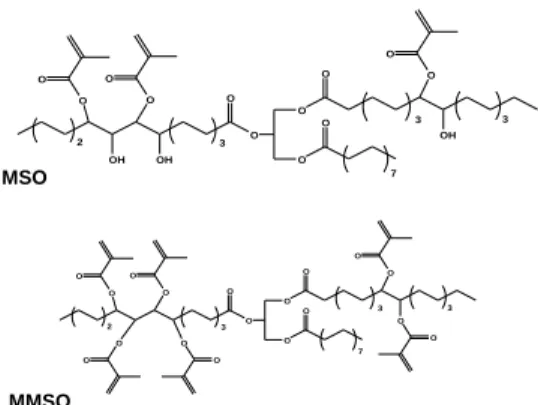BIO-BASED THERMOSET RESINS FROM SOYBEAN AND
LINSEED OILS FOR STRUCTURAL COMPOSITES
Kayode Adekunle, Dan Åkesson, Fatimat Bakare and Mikael Skrifvars School of Engineering, University of Borås, Sweden
Epoxidised soybean and linseed oil were used as a starting material for the synthesis of thermoset resins for renewable polymer composites. Chemical modifications of the oils were achieved by polymerizing the epoxidised oils with methacrylic acid and methacrylic anhydrides. The synthesis was done at a temperature of about 120°C in the first step with methacrylic acid and the second step was done with methacrylic anhydride at a temperature between 70 and 85°C. The synthesis proceeded for about 12 hours for the soybean oil modification and 5 hours for the linseed oil modification. The products obtained from the first synthesis were referred to as methacrylated soybean or linseed oil, whereas the product obtained from the second synthesis was referred to as methacrylic anhydride modified soybean or linseed oil. The chemical structures of the obtained bio-based polymers from the soybean oil are shown in figure 1. O O O O O O 2 3 3 3 7 O O O OH O OH O O OH O O O O O O 2 3 3 3 7 O O O O O O O O O O O O MSO MMSO
Figure 1. Methacylated soybean oil (MSO) and methacrylic anhydride modified soybean oil (MMSO).
Further characterization of the bio-based resins confirmed that the modification of the epoxidised materials actually occurred. FT-IR, 1H NMR and 13C NMR spectroscopy confirmed the modification reactions on the oils. The epoxy functional group had been consumed by the reaction with methacrylic acid and methacrylic anhydride as shown by the NMR analysis.
The obtained resin can be utilized as matrix resins in composite manufacturing. The thermoset polymers prepared in this study have positive environmental attributes as they are partly made from plant oil, which is renewable.
